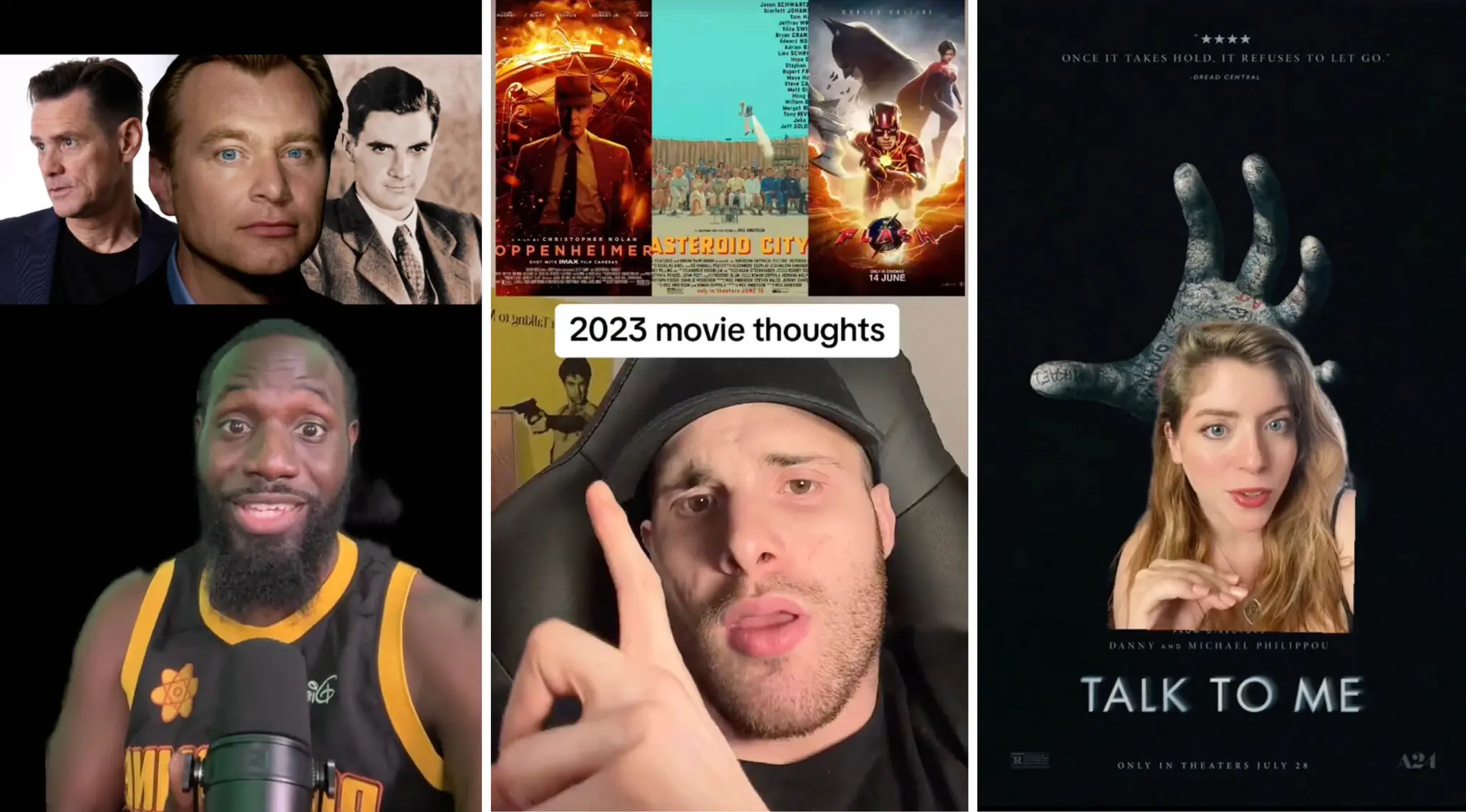-
MovieTok isn't a new way of talking about movies, it's anti-intellectual garbage
by Mitchel Green - August 17, 2023
|
mitchelgreen34@gmail.com
 source: The New York Times/TikTok
source: The New York Times/TikTok
On August 15, The New York Times published a piece about the leaders of film discourse on TikTok and the direction they are pushing the art of film criticism. The article frames these content creators as revolutionaries, punching back against snobbery and pretentiousness in conversation about movies. The writer even compares them to the radical Cahiers du Cinema critics that sparked the French New Wave in the 1950s. It’s one of the dumbest stories I have ever read.
Let’s get one thing clear. These people are not critics. Calling them that is a disservice to the actual writers who enhance our understanding of the medium with their work. Thankfully, according to the piece, they would tell you they don’t want to be called critics. But it isn’t out of some self-awareness that understands their role as shameless promoters of mostly major studio schlock. Instead, it is out of contempt for what actual critics do stemming from a fundamental misunderstanding of the role art critics play in society.
These internet microcelebrities think they’re smashing rampant elitism in film discussion, opening the door for more democratic, casual conversations about the medium. They just want to “share their love of movies” with the world. There’s a place for this on social media and in society, but a couple big problems arise.
First, their supposed love of movies is not a widely cast net. The content these users put out is typically about the latest major Hollywood releases — a lot of superheroes, a lot of Disney — while occasionally talking about a viral independent hit. It shouldn’t be surprising, given that those topics are the kinds that get the most engagement on social media, but it shrinks a mass audience’s boundaries of what films are worth talking about.
Second, this “spread positivity and awareness of everything” approach is utterly pointless and shamelessly bootlicking. At best, it’s the equivalent of hearing your coworker explain what they watched the night before and their basic thoughts on it. You might check it out, or perhaps you already have, but it doesn’t expand your knowledge or appreciation of what you’re watching. At worst, it blurs the line between critic and publicist and becomes little more than film marketing with an unearned sense of authority — an authority these content creators believe traditional film critics with a wealth of knowledge about the history and aesthetics of the medium should not have.
Scrolling briefly through any of the accounts The New York Times mentions, you will rarely find a hint of contextualization or thematic/formal analysis in any user’s posts. Even when creators like Seth Mullan-Feroze (@sethsfilmreviews) talk about lesser-known foreign and art-house films, the discussion about the movies is incredibly surface-level. They use buzzwords and phrases like raw, dramatic, and good cinematography without evidence to explain why or how the film incites those reactions. It has the appearance of criticism without actually being so. Is the short-form video format of TikTok to blame? Perhaps. You can only say so much about a film in 30-90 seconds. It’s entirely possible that given a platform to expand — like in a longer YouTube video or a written piece — these creators would be able to back up their claims and their criticisms with something substantive. All that means is that TikTok should not be the new frontier for film discourse. It favors flashy, inoffensive slop that tells the viewer what it wants to hear so they keep returning to reinforce their prior beliefs.
The championing of these lazy philistines is a symptom of the larger societal issue of the increasingly growing view that art is disposable. The piece acknowledges the massive cuts to arts section budgets at major publications that have and will continue to happen into the foreseeable future. These content creators don’t see film as art but as entertainment. To them, it’s disposable content that shouldn’t require deep thought, and you should always find something to appreciate because the people who made it tried their best. The disdain for speaking negatively of a work of art allows laziness to propagate in the medium because the industry will always chase what they think people want to see. It also diminishes the meaning of a work by deeming it not worthy of serious discussion. Real critics aren’t hard on an art form because they hate it. They likely love it more than anyone else and want to see it reach its full potential.
There is nothing wrong with these individual creators specifically — they are just people who generally like movies and enjoy talking about them on the internet. But to prop them up as a group that is single-handedly changing the art of film criticism, and going so far as to say this is both revolutionary and a good thing, is going too far. Great film criticism can simultaneously be accessible, biting, and profound. Roger Ebert's writing was easy and casual enough for 12-year-old me to understand, but his strong opinions, empathy, and endless curiosity made him great. The combination of those three things is what the leaders of MovieTok lack. It’s why they’ll never create anything as meaningful as the actual critics who have come before or will come after.

